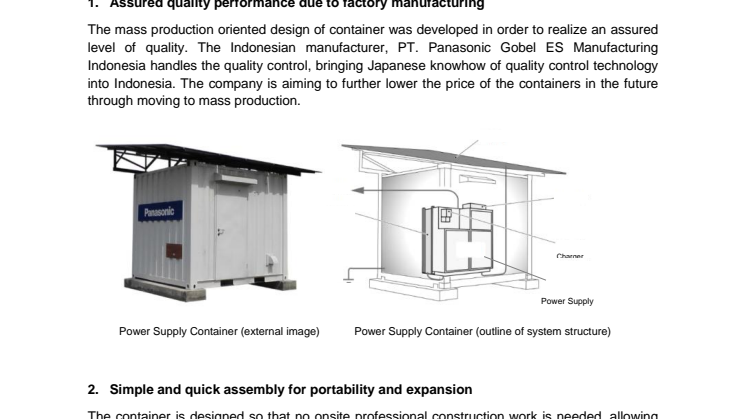Press release -
"Power Supply Container" Improves Educational Environment and Water Supply Conditions
Bandung, Indonesia - Panasonic Corporation announced the installation of the self-developed "Power Supply Container", a stand-alone photovoltaic power package, at the National Elementary School Malabar 04 in the village of Banjarsari, Bandung District, West Java Province, Indonesia, in order to improve the educational environment in this mountainous region. On July 30, 2015, a handover ceremony was held jointly with FEDUs, an Indonesian NGO and a project partner. Approximately 350 individuals including the Bandung government officials, Counselor Takonai from the Embassy of Japan in Indonesia, and the school's teachers and students were invited to the ceremony.
The village of Banjarsari, located at an altitude of approximately 1,500m above sea level, was once electrified by the power company. However, the National Elementary School Malabar 04, which is located in the middle of a tea plantation with a radius of 1 to 2 km, was isolated from the benefits of electrification for 32 years. The school struggled to provide an adequate educational environment through the use of IT, including PCs for the students.
Panasonic will deliver its "Power Supply Container" to the National Elementary School Malabar 04 through the public-private-partnership project that takes advantage of the Grant Assistance for Grassroots Human Security Projects*1 promoted by the Embassy of Japan in Indonesia, and supply power for LED lighting, the school's electrical equipment, and educational tools including PCs, projectors, and TVs to eventually improve the facilities and educational environment.
The "Power Supply Container" is a stand-alone power package that uses Panasonic-made solar panels and storage battery units. During school hours, the "Power Supply Container" supplies power to electrical equipment installed in each classroom and enables the use of lighting fixtures and provision of audiovisual aids by way of PCs and TVs, thereby improving the educational environment. After school, power is used for a wide range of purposes on school premises through the "Power Supply Container" operation union to collect management fees required to maintain the equipment and eventually contribute to the vitalization of the regional community and improvement of regional power infrastructure issues.
The National Elementary School Malabar 04 also suffered from an unstable water supply; however, this project allowed the installation of a water tank and pump to improve in-school water supply conditions.
In this project, Panasonic is responsible for the introduction of the equipment and provision of technical assistance to FEDUs. FEDUs will support the establishment of self-sustainable power supply organizations at the National Elementary School Malabar 04 or in the village of Banjarsari and provide training and support associated with the operation, management, and maintenance of the equipment, with the aim of achieving a sustainable power supply. Panasonic receives support for this project from the BOP Group of the Japan External Trade Organization(JETRO), as well as for generating demand for stand-alone photovoltaic power packages and proposing problem solutions.
Panasonic will further strive to extend a stable power supply to areas without electricity and backup power sources to places that suffer frequent power blackouts, and provide improved social support, including emergency power sources, in the event of disasters. The Company will provide a more rich and comfortable lifestyle in Indonesia and other emerging countries with problems of the electricity infrastructure.
*1 Joint public/private sector projects using Grant Assistance for Grassroots Human Security Projects: the provision of financial assistance in the form of ODA to relatively small-scale projects run locally by local public bodies, educational/medical institutions, NGOs and so on in developing nations. Ministry of Foreign Affairs of Japan provides support for corporate social responsibility of Japanese corporations to develop regional economies and socioeconomic infrastructure in countries undertaking such projects, particularly for cases run jointly by the public and private sectors.
* HIT is a registered trademark of the Panasonic Group in Japan
Related links
Topics
- Business enterprise
Categories
- sustainability
- corporate
- indonesia
- csr
- energy
About Panasonic
Panasonic Corporation is a worldwide leader in the development of diverse electronics technologies and solutions for customers in the consumer electronics, housing, automotive, enterprise solutions and device industries. Since its founding in 1918, the company has expanded globally and now operates 468 subsidiaries and 94 associated companies worldwide, recording consolidated net sales of 7.715 trillion yen for the year ended March 31, 2015. Committed to pursuing new value through innovation across divisional lines, the company uses its technologies to create a better life and a better world for its customers. To learn more about Panasonic: http://www.panasonic.com/global
About Panasonic Asia Pacific
Panasonic Asia Pacific provides the whole range of the brand’s products and solutions across the Southeast Asia and Oceania (APAC) region, covering 27 countries including 10 offices in Australia, Cambodia, Indonesia, Malaysia, Myanmar, New Zealand, Philippines, Singapore, Thailand and Vietnam.
Based in Singapore, Panasonic Asia Pacific regional headquarters focuses on creating A Better Life, A Better World by promoting its Business-to-Business portfolio while maintaining solid Business-to-Consumer growth. The region has 40 manufacturing sites, supporting Panasonic’s global production activities in the housing, agriculture, energy solutions, appliances, components and devices sectors.

